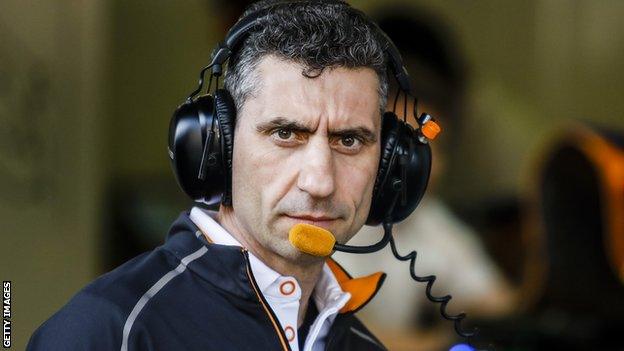McLaren: Andrea Stella promoted in Andreas Seidl's three-pronged restructure
- Published

Stella had a 14-year spell with Ferrari
McLaren team principal Andreas Seidl has completed the leadership structure he hopes will take the team back to the front of Formula 1.
The German has promoted Italian Andrea Stella to racing director from his former role of performance director.
Stella, who joined McLaren from Ferrari at the end of 2014, will now be head of all trackside operations, including engineering and race strategy.
It creates a three-pronged management structure under Seidl as team boss.
Technical director James Key, recruited before Seidl came on board, leads technical and design function.
He works alongside Stella and production director Piers Thynne, who was promoted in July.
Seidl installed the structure of three main divisions reporting into him when he began his role as team principal last May, having previously been boss of Porsche's World Endurance Championship team.
The idea is to have a traditional management structure which is easy to understand and gives clear responsibilities, reporting lines and accountability.
Seidl had been fulfilling the racing director role himself through 2019 as he worked to understand McLaren and find the right appointment.
The racing director role had previously been occupied by Frenchman Eric Boullier as a de facto team boss before his departure in July 2018 as part of a major restructuring aimed at halting the team's slide down the rankings.
Making progress
Seidl's moves mark the latest in a series of significant changes at McLaren as they seek to re-establish a position at the front of F1 after years of decline.
His recruitment was part of a marked step forward in 2019.
After finishing 2018 in sixth place in the constructors' championship and ending the year with the second-slowest car on the grid, McLaren took a strong fourth place overall last year with new a driver line-up comprising Spaniard Carlos Sainz and British rookie Lando Norris.
Seidl describes McLaren's progress in 2019 as "an incredible step forward. It gives us a lot of motivation and energy".
He added: "Looking ahead, we have to keep this momentum up and simply have to keep on pushing in order to achieve our ambitious targets.
"At the same time, we should never underestimate what our competitors can do. They all have the same high targets and will work very hard towards them as well."
Ringing the big changes
McLaren last won a race in 2012 and, although they slipped badly from competitiveness in their last two seasons with Mercedes engines in 2013 and 2014, they believed through their relationship with engine partner Honda from 2015-17 that the power-unit was the overriding reason for their lack of pace.
But a switch to Renault engines for 2018 underlined that the team's car design had fallen behind the best outfits, and Boullier was one of a number of casualties that summer, along with former chief technical officer Tim Goss and engineering director Matt Morris.
Since then, the team has been fundamentally restructured as McLaren Racing chief executive officer Zak Brown, who joined the team in 2017, oversaw a major rethink of operations.
Seidl and Key were recruited in 2018 but could not join McLaren until the spring of 2019 as a result of extensive 'gardening-leave' periods from their former employers, Toro Rosso in the case of Key.
In the meantime, Pat Fry, a long-time McLaren engineer in the 1990s and 2000s, returned to the team in 2018 and helped oversee a major step forward for the 2019 season.
The arrival of Key in March and Seidl in May appeared to give McLaren fresh momentum, and the team hope to consolidate their progress through 2020 before major changes in 2021.
These are both external - with the new technical regulations and cost cap aimed at bringing the field closer together - and internal, with a decision led by Seidl to switch to Mercedes engines for 2021.
Fry left McLaren in the summer having been poached by Renault, who he will join at some point next year once the two teams have negotiated a starting date.
Renault have not confirmed Fry's position but he is expected to be a de facto replacement for chassis technical director Nick Chester, who left the team at the end of a 2019 season in which Renault failed to meet their own expectations and slipped behind McLaren to fifth place in the constructors' championship.